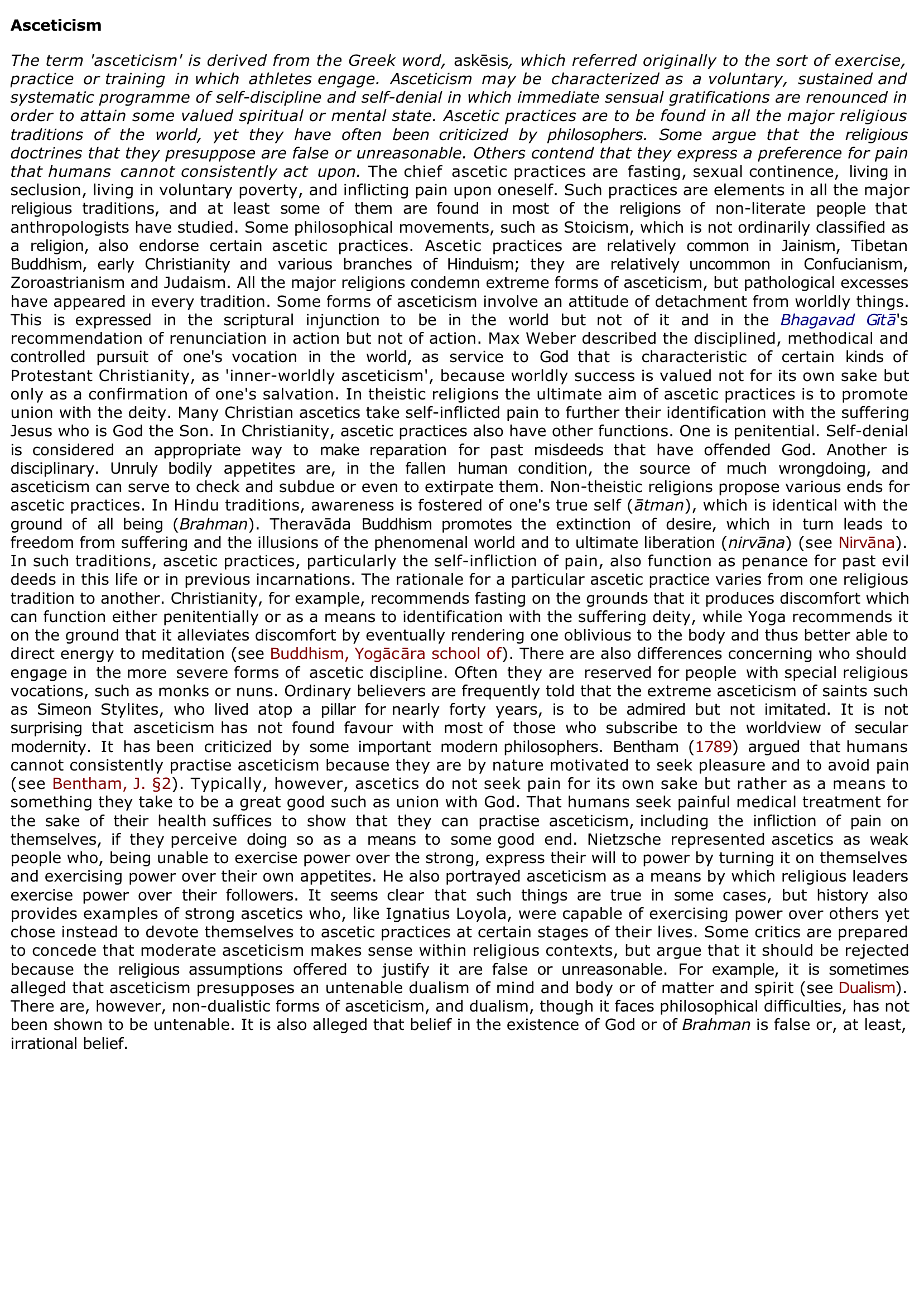Asceticism
Extrait du document
«
Asceticism
The term 'asceticism' is derived from the Greek word, askēsis, which referred originally to the sort of exercise,
practice or training in which athletes engage.
Asceticism may be characterized as a voluntary, sustained and
systematic programme of self-discipline and self-denial in which immediate sensual gratifications are renounced in
order to attain some valued spiritual or mental state.
Ascetic practices are to be found in all the major religious
traditions of the world, yet they have often been criticized by philosophers.
Some argue that the religious
doctrines that they presuppose are false or unreasonable.
Others contend that they express a preference for pain
that humans cannot consistently act upon.
The chief ascetic practices are fasting, sexual continence, living in
seclusion, living in voluntary poverty, and inflicting pain upon oneself.
Such practices are elements in all the major
religious traditions, and at least some of them are found in most of the religions of non-literate people that
anthropologists have studied.
Some philosophical movements, such as Stoicism, which is not ordinarily classified as
a religion, also endorse certain ascetic practices.
Ascetic practices are relatively common in Jainism, Tibetan
Buddhism, early Christianity and various branches of Hinduism; they are relatively uncommon in Confucianism,
Zoroastrianism and Judaism.
All the major religions condemn extreme forms of asceticism, but pathological excesses
have appeared in every tradition.
Some forms of asceticism involve an attitude of detachment from worldly things.
This is expressed in the scriptural injunction to be in the world but not of it and in the Bhagavad Gītā's
recommendation of renunciation in action but not of action.
Max Weber described the disciplined, methodical and
controlled pursuit of one's vocation in the world, as service to God that is characteristic of certain kinds of
Protestant Christianity, as 'inner-worldly asceticism', because worldly success is valued not for its own sake but
only as a confirmation of one's salvation.
In theistic religions the ultimate aim of ascetic practices is to promote
union with the deity.
Many Christian ascetics take self-inflicted pain to further their identification with the suffering
Jesus who is God the Son.
In Christianity, ascetic practices also have other functions.
One is penitential.
Self-denial
is considered an appropriate way to make reparation for past misdeeds that have offended God.
Another is
disciplinary.
Unruly bodily appetites are, in the fallen human condition, the source of much wrongdoing, and
asceticism can serve to check and subdue or even to extirpate them.
Non-theistic religions propose various ends for
ascetic practices.
In Hindu traditions, awareness is fostered of one's true self (ātman), which is identical with the
ground of all being (Brahman).
Theravāda Buddhism promotes the extinction of desire, which in turn leads to
freedom from suffering and the illusions of the phenomenal world and to ultimate liberation (nirvāna) (see Nirvāna).
In such traditions, ascetic practices, particularly the self-infliction of pain, also function as penance for past evil
deeds in this life or in previous incarnations.
The rationale for a particular ascetic practice varies from one religious
tradition to another.
Christianity, for example, recommends fasting on the grounds that it produces discomfort which
can function either penitentially or as a means to identification with the suffering deity, while Yoga recommends it
on the ground that it alleviates discomfort by eventually rendering one oblivious to the body and thus better able to
direct energy to meditation (see Buddhism, Yogācāra school of).
There are also differences concerning who should
engage in the more severe forms of ascetic discipline.
Often they are reserved for people with special religious
vocations, such as monks or nuns.
Ordinary believers are frequently told that the extreme asceticism of saints such
as Simeon Stylites, who lived atop a pillar for nearly forty years, is to be admired but not imitated.
It is not
surprising that asceticism has not found favour with most of those who subscribe to the worldview of secular
modernity.
It has been criticized by some important modern philosophers.
Bentham (1789) argued that humans
cannot consistently practise asceticism because they are by nature motivated to seek pleasure and to avoid pain
(see Bentham, J.
§2).
Typically, however, ascetics do not seek pain for its own sake but rather as a means to
something they take to be a great good such as union with God.
That humans seek painful medical treatment for
the sake of their health suffices to show that they can practise asceticism, including the infliction of pain on
themselves, if they perceive doing so as a means to some good end.
Nietzsche represented ascetics as weak
people who, being unable to exercise power over the strong, express their will to power by turning it on themselves
and exercising power over their own appetites.
He also portrayed asceticism as a means by which religious leaders
exercise power over their followers.
It seems clear that such things are true in some cases, but history also
provides examples of strong ascetics who, like Ignatius Loyola, were capable of exercising power over others yet
chose instead to devote themselves to ascetic practices at certain stages of their lives.
Some critics are prepared
to concede that moderate asceticism makes sense within religious contexts, but argue that it should be rejected
because the religious assumptions offered to justify it are false or unreasonable.
For example, it is sometimes
alleged that asceticism presupposes an untenable dualism of mind and body or of matter and spirit (see Dualism).
There are, however, non-dualistic forms of asceticism, and dualism, though it faces philosophical difficulties, has not
been shown to be untenable.
It is also alleged that belief in the existence of God or of Brahman is false or, at least,
irrational belief..
»
↓↓↓ APERÇU DU DOCUMENT ↓↓↓

































